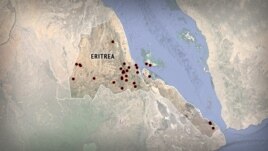22 August, 2018
Dejen Ande Hishel was a fighter pilot in Eritrea. He trained in Russia and flew during Eritrea's war with Ethiopia in the 1990s. But in 1999, Eritrean officials arrested him. He spent 15 years in an Eritrean prison although he was never charged with or tried for a crime. He escaped in 2014.
Today, Dejen lives in Sweden and is talking publicly about people who were jailed like he was, but remain in prison. Many have been held, without trial, or contact with the outside world, for more than 10 years.
"I feel a sense of responsibility to speak out not only for myself but for all those left in prison," he told VOA.
End of war
Dejen has a reason for speaking out now. Eritrea and Ethiopia just ended their 20-year border war. The government ordered strong measures connected to the conflict, including required military service for all citizens. Travel in and out of the country is also restricted.
Eritreans are hoping those measures will be loosened and prisoners will be free now that there is peace.
In July, Radio France International said that the Eritrean government freed 35 people arrested for belonging to illegal Christian groups.
Berhane Asmelash is an activist for Eritreans who face religious persecution. He told RFI that the release of the Christians had been planned earlier and were not the result of the peace deal.
The government has not yet admitted the release. VOA sought comment from Yemane Meskel, the Minister of Information, several times. He did not answer.
But, in comments published in The Economist magazine, Yemane said people need to give the government time to make changes.

A map of Eritrea, with sites of possible detention centers plotted, based on data from Amnesty International.
Still in prison
Dejen says his freedom in Sweden is not complete because so many are still in prison in Eritrea.
Semhar Habtezion's father is among them. Brigadier General Habtezion Hadgu founded the Eritrean Air Force, his son told VOA.
Semhar said his father argued with Eritrean President Isaias Afwerki about how the air force was operated. He also questioned the imprisonment of men like Dejen. The general was arrested and jailed himself in 2003. His family has no information about him.
The situation of men like Habtezion Hadgu occupy Dejen's thoughts.
"Even when I speak to you from outside the country, I see myself as if I am still in prison because all my colleagues are still there," he said.
He described Eritrean prison conditions as difficult to survive.
"There are times where you might die due to hunger or sickness." And, other times, he said, prison officials will not permit medical care for the detainees.
Law and order
The United Nations and activist groups have documented widespread human rights abuses in Eritrea. Human Rights Watch said Eritreans face arrest and imprisonment without reason and they can be held for years without limitation.
The government says all such reports are false and politically based.
Dejen longs for the rule of law and a fair system.
"Whether we solve it through the rule of law or peace, we need to sit down and discuss. If that is the discussion, I would go back to my country tonight. I would stand trial and even go back to jail if there is law and order," he said.
I'm Susan Shand.
VOA's Salem Solomon reported this story. Susan Shand adapted it for Learning English. Caty Weaver was the editor.
______________________________________________________________
Words in This Story
persecute – v. to treat (someone) cruelly or unfairly especially because of race or religious or political beliefs
colleague – n. a person you work with
due to – adj. because of (something)